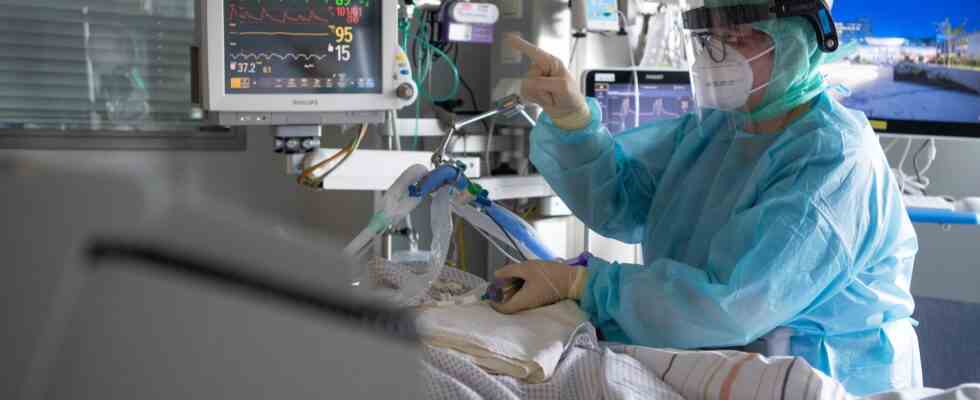interview
Status: 28.12.2022 08:35 a.m
Corona waves, staff problems, respiratory diseases: 2022 was exhausting from the point of view of doctors – but also the year in which the pandemic ended. A lot has been learned, says intensive care physician Karagiannidis. Some things change permanently.
tagesschau.de: In February 2022, the Omikron variant still kept us busy. The wave then slowly ebbed away and in March the first corona restrictions were already lifted. When you think back to that time, what immediately comes to mind?
Christian Karagiannidis: It was ambivalent: there was hope that the pandemic would finally end. And on the other hand, we were still a bit worried: How could Omikron develop further? At the time, as a council of experts, we had outlined three scenarios of how the pandemic could continue. And there was still some uneasiness with it in the spring of the year.
To person
Christian Karagiannidis is a specialist in internal medicine, neurology and intensive care medicine at the Cologne Clinic. He is also President of the German Society for Internal Intensive Care Medicine and Emergency Medicine.
tagesschau.de: When you look at the situation of the doctors, how did you feel? relief?
Karagiannidis: Yes, of course. At the end of 2021, with the delta wave, we had more patients with such a high degree of severity than at any other time of the pandemic. People were really exhausted through and through and you could tell that at some point the time had come when you felt relief. Although it wasn’t just me that you still have in the back of your mind: will it be that bad again? Could it be going in the wrong direction again? It was more of a gradual process until the summer.
Annual review science: Corona – The pandemic and its consequences
12/23/2022 3:36 p.m
problem of absenteeism
tagesschau.de: In summer, another wave hit us a little earlier than expected and maybe a little harder than expected. How did you perceive them?
Karagiannidis: We perceived them as extremely unpleasant, not on the part of the patients. That wasn’t really a problem, but it was the first time this year that we had extreme staff shortages across the board. This presented us with such great challenges that we had to block beds beyond what we already have due to the lack of staff. This was a huge problem for several weeks. And we were incredibly lucky in the summer that we didn’t have as many patients, neither from Corona nor from other infectious diseases, as we have at the moment.
tagesschau.de: And then came the autumn wave and also a violent flu epidemic. That means that the illnesses and the problems in the hospitals actually merged seamlessly, right?
Karagiannidis: At the beginning of autumn we had a somewhat quieter phase. But with the beginning of the RS virus wave in children and influenza, two viral diseases have come together and have spread very well. Because we actually had no more real measures. And we noticed that these virus waves were significantly earlier than we are usually used to.
What bothered us is that a lot of staff was absent at the same time and that we saw an increasing number of patients, especially in the emergency rooms. And our main problem is that we simply don’t have the capacity we had before the pandemic.
“Did Some Good Things”
tagesschau.de: As an intensive care doctor, what are you taking with you from this year 2022?
Karagiannidis: We did some good things and we also managed to establish things during the pandemic that we haven’t established for years. One example is the intensive register, another is the monitoring of waste water, which we should certainly expand further. We have learned that clinics can work together in networks. This was also much more difficult in the pre-pandemic times.
But what I mainly take away is that we will no longer be in the state we were in before the pandemic. In intensive care alone, we have lost 25 percent of the high-care beds because there are simply no staff available. And we will now successively struggle with this problem every year that we have stronger waves of infection in winter and that these are encountering less and less capacity in the healthcare system. We will have to prepare extremely well for that. And I dare say that in the next few years we will see that we will have a few weeks in the winter where the hospitals have to go into an emergency mode and focus fully on emergency care.
Reforms are possible
tagesschau.de: Anything positive to take away from this 2022?
Karagiannidis: Yes. What we have learned is that we had some things in the pandemic – be it the intensive care register, be it better cooperation between hospitals – that worked poorly or not at all in the times before the pandemic. That makes me hopeful that we can save it over the next few years because we will need it very urgently.
What we have also seen is that this “tanker health care system”, which is extremely difficult to control in Germany, can always move when you really have a deep crisis. And we all know that we have an incredible demographic shift ahead of us. We knew that in 2010 just as much as we do today. At that time, reforms were almost impossible. And now in the crisis – and that also makes me hopeful – you can see that those involved are willing to devote themselves to far-reaching reforms.
The government commission on hospital reform has just made a fundamental proposal as to how remuneration in hospitals can be structured in such a way that the economic pressure is removed and the population is still well cared for across the board. That makes me feel positive, but there are difficult years ahead of us.

